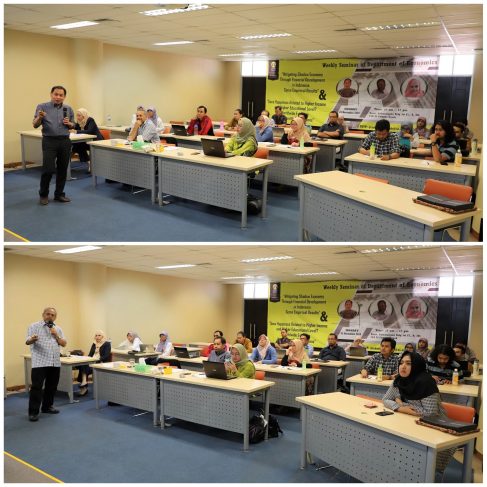Two Presenters of PPIE FEB UI Weekly Seminar Discussed Shadow Economy Mitigation
Nino Eka Putra ~ Humas FEB UI
DEPOK – Weekly Seminar of Postgraduate Program in Economics, Department of Economics, FEB UI with the topic “Mitigating Shadow Economy Through Financial Development in Indonesia: Some Empirical Results” which took place in room 306, Postgraduate Building, on Monday (12/23/2019).
Presenters of the Weekly Seminar on the topic of the discussion were delivered by two people, namely Sugiharso Safuan as the Chair of the Economics Studies Postgraduate Program (PPIE) FEB UI and Muzafar Shah Habibullah as Professor from Universiti Putra Malaysia
Sugiharso Safuan and Muzafar Shah Habibullah explained that the shadow economy and finance are parallel with the increasing economic development in the underground or shadow economy. In addition, the fact of life and is increasing throughout the world. Fighting shadow economy must be an important agenda for any government.


Shadow economy closes all production of market-based legal goods and services that are deliberately hidden from public authorities because of reasons to avoid paying income, value added or other taxes. Then, avoid paying social security contributions. Furthermore, avoiding having to meet certain legal labor market standards such as minimum wages, maximum hours of work, safety standards. And to avoid compliance with certain administrative procedures such as filling out statistical questionnaires / other administrative forms.
This paper explores the relationship between shadow economy and financial sector development in Indonesia with the inclusion of control variables such as Foreign Direct Investment (FDI) and misery index. We calculated the size of the shadow economy in Indonesia for the period 1981 to 2015 using the Modified Cash Deposit Ratio (MCDR) approach proposed by Pickhardt and Sardia (2011).
In this study, we use several estimators such as Ordinary Least Squares (OLS), Autoregressive Distributed Lag (ARDL), Fully Modified OLS (FMOLS), Dynamic OLS (DOLS), and Canonical Cointegrating Regression (CCR) to estimate long-term models for shadow shading economy. We also investigate the opinions made by Blackburn et al. (2012) that financial development can mitigate a higher level of shadow economy than financial development leads to a lower level of shadow economy.
The results show that there is a long-term non-linear relationship between shadow economy and financial development in Indonesia, showing an inverted U-shape curve that at a lower (higher) level of financial development commensurate with the higher (lower) level of shadow economy.
On the other hand, FDI also has a mitigating effect on shadow economy, while an increase in misery index increases the size of shadow economy in Indonesia. The mitigating effect of financial developments on shadow economy in Indonesia is very strong even when we tested the model using quantile regression analysis. One of the policy implications of this study is that the financial sector has an important role in reducing the shadow economy in Indonesia by increasing accessibility to finance and credit markets.
It is estimated that the long-term model shows that increasing income and misery index increases the size of shadow economy in Indonesia. With the current poverty rate of more than 9% and a widening income gap between residents. Thus, economic growth does not help reduce the size of the shadow economy. Increased pressure from the hardships of living in bad conditions people are pushed into the shadow economy. (Des)






